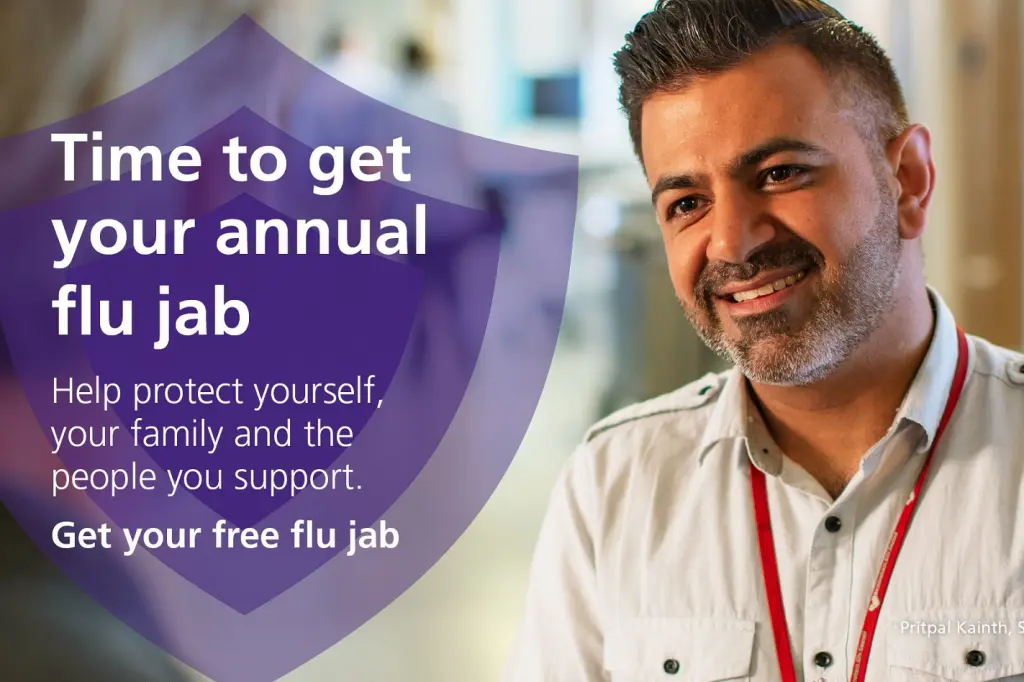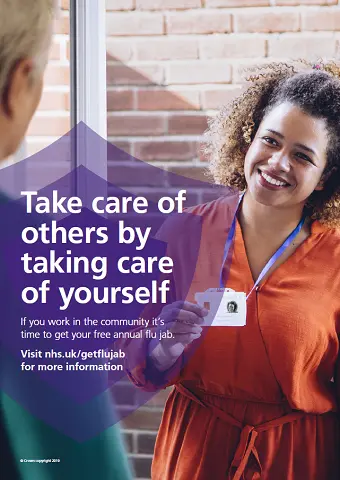19th November 2019
A guest blog from the National Infection Service, Public Health England.

Help us help you this winter by getting your flu vaccination – it’s free because you need it
People sometimes think flu – short for influenza – is just a bad cold but having it can be much worse. For some people, flu puts them at increased risk of developing more serious illnesses such as bronchitis and pneumonia or can make existing conditions worse. In the worst cases, flu can result in a stay in hospital, or even death. That’s why the flu vaccine is free – because eligible groups really need it.
This season, the flu vaccine will be offered to:
- pregnant women
- children aged 2 and 3 years old
- all primary school children
- adults with underlying medical conditions
- health and social care workers
Health visitors play an important role in ensuring that eligible groups get their vaccine:
Pregnant women
Pregnancy naturally weakens the body’s immune system and, as a result, flu can cause serious complications for women and their babies. One of the most common complications of flu is bronchitis, a chest infection that can become serious and develop into pneumonia.
If women have flu while they’re pregnant, it could mean their baby is born prematurely or has a low birthweight which could even lead to stillbirth or death.
The flu jab is the safest way to help protect pregnant women and their babies against flu, no matter how many months pregnant or how fit and healthy the woman may feel.
Children
Children also tend to be super-spreaders of flu, so if they get it they are likely to infect other vulnerable or older family members. For most children, the flu vaccine is not usually an injection, just a quick and easy nasal spray.
Children aged 2 and 3 should receive the vaccine through their GP and all primary school aged children receive it in school. If you have a child who is of the eligible age, make sure you sign the consent form allowing them to have the flu vaccine at school.
Underlying conditions
Flu is a highly infectious disease and can lead to serious complications if you have an underlying health condition such as COPD, bronchitis, emphysema, diabetes, heart disease, kidney disease, liver disease or a chronic neurological disease like multiple sclerosis or cerebral palsy. Flu, on top of health conditions like these, increases your chance of serious health complications and a hospital visit.
Top tips for health and social care workers
- If you’re a frontline worker in the NHS, you’re more likely to be exposed to flu.
- You can have flu without any symptoms and pass it on to family, friends and patients, many of whom may be at increased risk from flu.
- Being healthy doesn’t reduce your risk of getting flu or passing it on.
Getting the flu jab early is one of the most effective ways to protect yourself, your family and your patients from flu.

- Take up your employer’s offer of a free flu jab and encourage your colleagues to do the same
- Good hand hygiene can help prevent the spread of flu. Carry tissues and use them to catch coughs or sneezes, bin the used tissues as soon as possible and then wash your hands.
For more information visit www.nhs.uk/fluvaccine
You can download an array of ‘Time to get your flu jab’ assets, the brand new flu vaccination campaign aimed at health and social care workers: https://campaignresources.phe.gov.uk/resources/campaigns/92-health-and-social-care-workers-flu-immunisation-

